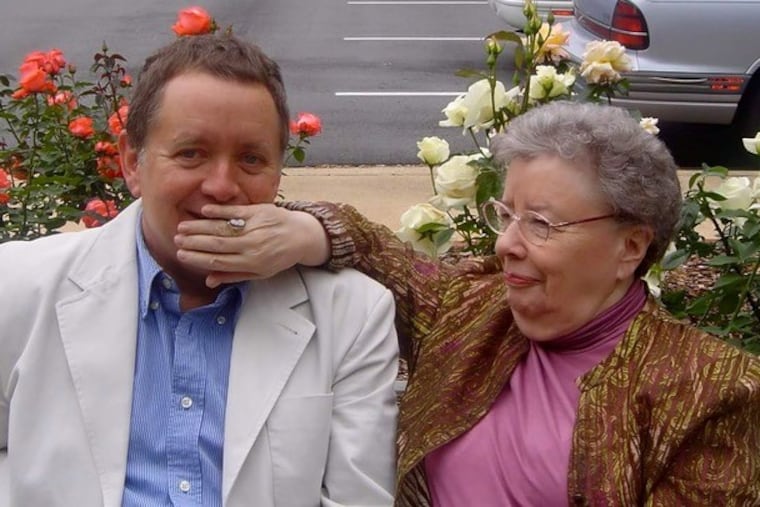John Woestendiek, Pulitzer Prize winning reporter, columnist, and author, dies at 66
Mr. Woestendiek was a brilliant journalist, but you'd never know it. In the newsroom, he was rumpled, soft-spoken, and self-effacing.

John Woestendiek, 66, a longtime Inquirer reporter who won a Pulitzer Prize for investigative reporting that exonerated and freed a Delaware County man convicted of murder, died Wednesday, June 24, at a hospice in Winston-Salem, N.C.
His brother, Ted, said Mr. Woestendiek had been hospitalized on June 7 for treatment of complications from a stroke. Before that, he had contended with heart and kidney failure.
Born in Winston-Salem into a family of journalists, William John Woestendiek Jr. was a graduate of the University of North Carolina at Chapel Hill. He logged a newspaper career that included stops at the Arizona Daily Star in Tucson, the Lexington (Ky.) Leader, The Inquirer, the Charlotte (N.C.) Observer, and the Baltimore Sun. He left the Sun in 2008.
He was hired by then-Inquirer executive editor Eugene L. Roberts Jr. in 1977 on the strength of his reporting at the Leader, and stayed at the paper until 2000.
“I know people who had seen him operating in Kentucky, and looking at his clips, he seemed to be a brilliant reporter. It certainly turned out that way,” Roberts said. “He not only was an exceptional writer, he was very enterprising. Once he had the scent of the story, he hung in there until he got it.”
Roberts said Mr. Woestendiek was generally laid-back with a wonderful sense of humor. “But when he got on a story, the laid-backness disappeared,” Roberts said. “He was one of the great Inquirer talents.”
Daniel Rubin, senior editor for investigations at The Inquirer, said Mr. Woestendiek had more talent and less ego than many in the newsroom. His 1986 stories on Terence McCracken won a new murder trial and ultimately freedom for the teenage son of a Warlocks biker.
“He was arrested in the first place because of the reputation of his father, who was in a motorcycle gang,” Roberts said.
“It was the most admirable piece of reporting I’d ever read,” Rubin wrote in an email. “There was nothing showy about John – the opposite, really. He was rumpled, soft-spoken, self-effacing.”
In the mid-1990s, Rubin recalled, when the writer of the in-house newsletter went on vacation, Mr. Woestendiek turned out a few hilarious, irreverent editions. Then-editor Maxwell E.P. King picked Mr. Woestendiek to be the next Metro columnist, figuring some humor would lighten up The Inquirer’s pages.
One column he wrote in 1997, shared on Facebook by David Lee Preston, a now-retired editor at The Inquirer, about the newspaper’s criteria for handing out columns foretold today’s concerns about the need for a more diverse newsroom. Mr. Woestendiek cheekily pointed out that you pretty much passed the test to be a columnist if you were white, male, and middle-aged.
“Yes, we are a distinctive lot, we Inquirer columnists,” he wrote. “Wrestling with our middle age, grappling with our manhood, coping with our whiteness, and fighting the good fight, day after day, with ear hair.”
Lillian Swanson, a former editor at The Inquirer who used to sit next to Mr. Woestendiek, described him on Facebook as “funny without being mean. It’s a fine line.”
Michael Rozansky, who was one of Mr. Woestendiek’s editors at The Inquirer, said his columns were so engaging, it was almost impossible to trim them to fit the available space. “Always late, always long, always great,” Rozansky wrote in an online post.
After retiring from newspapers, Mr. Woestendiek, an animal lover, turned his attention to dogs. He wrote a daily blog called Ohmidog! The blog talked about his canine companions and raised compelling issues involving man’s best friend. He blogged until early June.
In 2010, he spun off one issue into his first book, Dog, Inc.: The Uncanny Story of Cloning Man’s Best Friend.
His second book, Travels With Ace, chronicled his year-long cross-country road trip with his dog, a mixed breed. Their adventures afforded him an appearance on Nightline.
The 2012 journey was inspired by John Steinbeck’s Travels With Charley in Search of America. It began as equal parts experiment and lark, to see if Mr. Woestendiek and his 130-pound mutt could survive on the cheap away from their home in Baltimore.
But it turned into something else.
“Our trip was all about the dog, a species that, without a doubt, holds a far higher place in society than it did in Steinbeck’s day,” he blogged. “We visited shelters, sanctuaries, and rescues; dog-friendly vacation spots, restaurants, bars, parks, and other places where people share in the joy of the species, or work to make the world a better place for dogs.
“Because when the world is a better place for dogs, it is a better place for people. It’s as simple as that.”
Besides his brother, Mr. Woestendiek is survived by two former wives, Jennifer Mitchell and Erika Hobbs; a sister; and a nephew. His son, Joseph Yoon Tae Woestendiek, died at age 26 in a June 2018 car accident.
Due to concerns about the coronavirus pandemic, no public services are planned at this time.
Donations may be made in his memory to the Forsyth Humane Society, 4881 Country Club Rd., Winston-Salem, N.C. 27104, where Mr. Woestendiek and his son volunteered.